Posts Tagged ‘Authors’
042 The Future with Mark Pesce
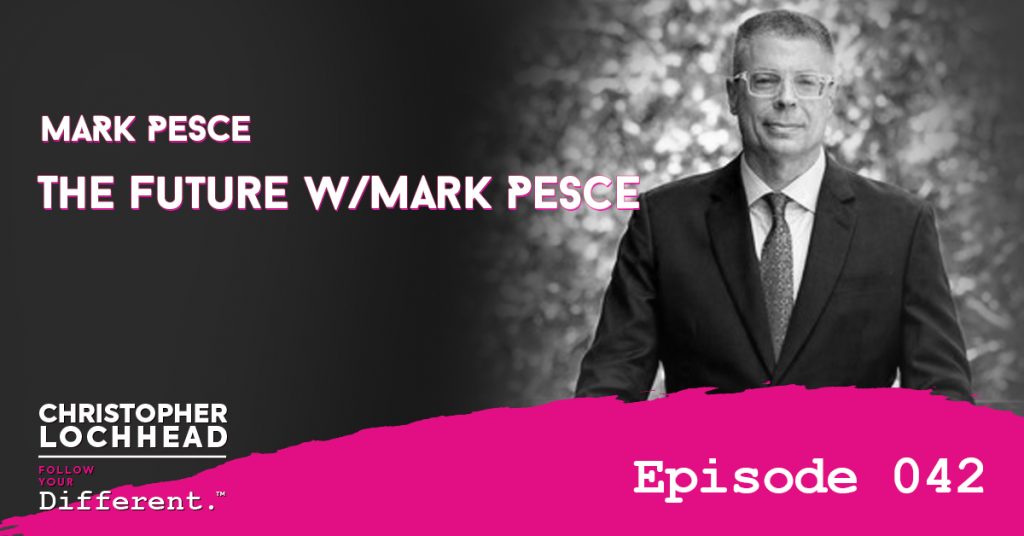
Podcast: Play in new window | Download (Duration: 58:29 — 53.8MB) | Embed
Subscribe: Apple Podcasts | Spotify | Pandora | RSS | More
In today’s episode, we hang out with a leading futurist Mark Pesce. He and Christopher discuss how smart the world is, why we should not be afraid of the future, how the next ten years will play out and how technology will transform our health and well-being.
Path to the Future
People get blindsided, uncontrollable and scared of what the future holds. We tend to give up when we feel that everything is not falling into place. Mark wants to show us that there is always a path through.
We have always had this path. All it takes is looking at our past and the clues to help us understand how we are going to find our .
“People come out of that with the sense of urgency that there is something that they can do, something that they can be that allows them to have not just a stake in the future, but a capacity to keep up with that future.” – Mark Pesce
Fear Because of Change
According to Mark, kids these days are so different because of their experiences.
We ask ourselves why the world is changing and why we can’t keep up. The idea of fear in us is because of change. And it is something that can be tolerated as we have the capacity to learn from one another.
“We like to master things and we don’t like it when those things change from underneath us because it makes us feel like we’re losing on mastery.” – Mark Pesce
A Smarter World
The world is getting smart. There are apps, computers, electronics, high speed mobile Internet and sensors everywhere. Mark said that over the span of 40 years, all we have done is to learn how to take all the principles that are embodied with all of these.
We have such connections, wiring and intelligence of the world that when we look at it one way, it seems very threatening. It can seem that the world is going to be so smart and would not need us anymore. But we should always remember that a machine can be dumped a million times faster than a human can.
“The challenge and pressure for us is can we get smart at the same pace the world is getting smart?” – Mark Pesce
To hear more about Mark, the leading futurist, download and listen to this episode.
Bio:
Mark Pesce is a leading futurist, author, entrepreneur and innovator.
He is an award-winning columnist for The Register and producer and host of This Week in Startups Australia. Mark invented VRML, the standard for 3D on the Web and a core component of MPEG-4. He also authored 6 books including:
• VRML: Browsing and Building Cyberspace
• The Playful World
• The Last Days of Reality
Links:
We hope you enjoyed Mark Pesce on this episode of Follow Your Different™! Christopher loves hearing from his listeners. Feel free to email him, connect on Facebook, Twitter, Instagram and subscribe on iTunes!
040 Veteran Mental Health w/ Duane France
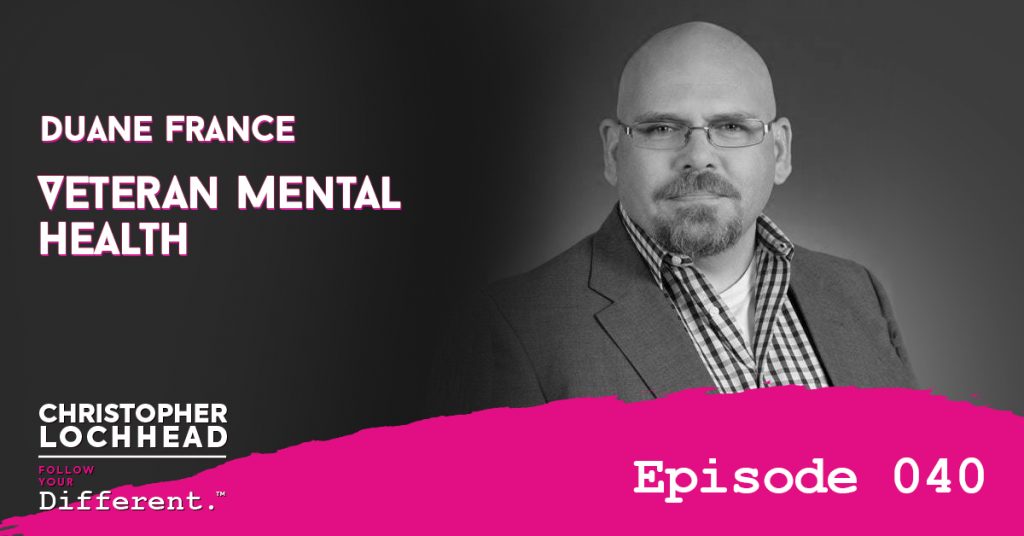
Podcast: Play in new window | Download (Duration: 1:11:29 — 65.6MB) | Embed
Subscribe: Apple Podcasts | Spotify | Pandora | RSS | More
For the second installment of this 3-part series on mental health and well-being, US combat veteran turned mental health counselor, podcaster and author Duane France joins Christopher. They share a powerful conversation about living a life of service, the challenges faced by veterans who leave the military and the power of having purpose and meaning.
“The military’s purpose is not to kill and destroy. It’s to protect and preserve.” – Duane France
On Veteran Stereotypes
When asked about what he would want the average American to know about the people in the military, Duane said that they are just like everybody else. Sadly, people like to stereotype the military veteran in three ways.
One, some would think of the veteran as a berserker suffering from PTSD. Sometimes, other people treat them as victims that need taking care of for the rest of their lives. And then there is the stereotype as a hero.
“There’s just a lot of stereotypes that go along with especially current era military… and it’s just simply not true.” – Duane France
Not So Different
All veterans want is for people to understand what they live through. Duane’s clients would say that they want people to know what they experience and to hear their stories. But at the same time, they don’t know how to tell these, feeling like no one can really understand the struggles of a veteran.
To help a military veteran reintegrate into civilian life, it is best to not treat them differently. They want to be seen not as victims or as villains, but as the average American with interesting stories.
Finding Purpose After Service
No matter how unique their stories go, veterans will always struggle to regain their footing on civilian soil. The transition is the hardest part, but with the help of people around them, they can achieve a new purpose.
Some of them can even become amazing and legendary entrepreneurs.
“When we leave the military, we wanna find a place for ourselves in the world. We wanna find purpose and meaning in our lives because what we did was really meaningful.” – Duane France
To hear more about the separation of war from the warrior and why veterans make great entrepreneurs from Duane, download and listen to the episode.
Bio:
Duane K. L. France is a combat veteran of both Iraq and Afghanistan, as well as a mental health counselor practicing in the state of Colorado.
He’s the host of the HEAD SPACE AND TIMING podcast and the author of Combat Vet Don’t Mean Crazy: Veteran Mental Health in Post-Military Life.
Links:
We hope you enjoyed Duane France on this episode of Follow Your Different™! Christopher loves hearing from his listeners. Feel free to email him, connect on Facebook, Twitter, Instagram and subscribe on iTunes!
039 Mentally Strong Women w/ Amy Morin
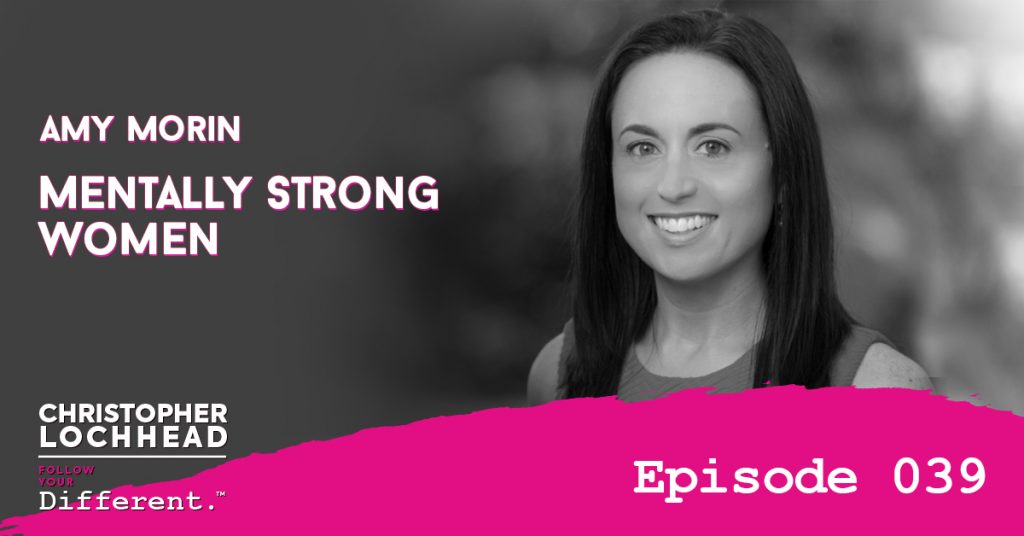
Podcast: Play in new window | Download (Duration: 1:07:09 — 61.7MB) | Embed
Subscribe: Apple Podcasts | Spotify | Pandora | RSS | More
On this first episode of a 3-part series on mental health and well-being, the mega-popular therapist, writer and speaker Amy Morin sits with us. She holds a powerful conversation with Christopher about how women can be super successful, why self-doubt can be a good thing and the power of true vulnerability.
“It’s okay to be a mentally strong woman who doesn’t act like a mentally strong man.” – Amy Morin
Women on Criticism and Rejection
Amy studied a lot for her new book. She found out that women tend to treat rejection and criticism as if they were the same thing.
Walking the path towards mental health and success is not letting others limit one’s potential. We must learn to take criticism where it comes from and separate criticism from people without stakes on our game. Studies also show that when people criticize you, they are likely telling you how they feel about themselves.
When Confidence Becomes Dangerous
According to Amy, people fail to recognize how dangerous confidence can be. Being completely confident that everything would work out without a hitch sometimes leads to some really poor decisions.
“A lot of the mistakes we make are because we’re overconfident about our abilities and we underestimate how tough the challenge is gonna be.” – Amy Morin
Nobody jumps on Get Rich Quick schemes unless they are 100% sure that nothing will go wrong. It goes to show how self-doubt can be used to one’s advantage.
Embracing Your Self-Doubt
Self-doubt can sometimes stop us on our tracks towards success. Being less confident about one’s attributes and qualities is only natural, but self-doubt doesn’t have to be a bad thing.
Studies on how students predict their performance on tests show that those who are confident about acing their tests are likely to do worse than those who show some doubt. This is mainly because they turned their self-doubt into effort and studied harder.
“Having a little self-doubt means, ‘I have to put in more effort, I have to study for this, I have to prepare, I have to sharpen my skills.’ And it keeps you on your toes.” – Amy Morin
Owning One’s Vulnerability
We sometimes liken vulnerability to weakness. But to become mentally strong, we need to embrace its true power.
“To really be vulnerable, you have to let people know that you struggle with things, that you’re not really okay sometimes.” – Amy Morin
Having the means to open up about our own vulnerabilities to the world has made it easier to embrace. But being vulnerable is not something that we should necessarily announce on social media all the time. Sometimes embracing it means having a private conversation between you and a loved one.
To learn more about the secrets to women’s success and Amy’s take on the #MeToo Movement, download and listen to the episode.
Bio:
Amy Morin is a licensed clinical social worker, psychotherapist, and a lecturer at Northeastern University.
The Guardian dubs her as the “self-help guru of the moment.” Forbes refers to her as a “thought leadership star.”
Her knowledge of mental strength stems far beyond her professional experience.
She’s experienced a series of losses in her personal life that gave her first-hand insight into the strategies that build resilience.
In 2013, her article 13 Things Mentally Strong People Don’t Do was read by over 30 million people around the world.
Her best-selling book, also called, 13 Things Mentally Strong People Don’t Do, is being translated into 25 languages.
Her newest book, “13 Things Mentally Strong Parents Don’t Do: Raising Self-Assured Children and Training Their Brains for a Life of Happiness, Meaning, and Success” is a sensation.
Amy’s advice has been featured by a number of media outlets, including Parenting, Time, Fast Company, Good Housekeeping, Elle, Business Insider, Cosmopolitan, Success, Oprah.com, Health, Fox News, US News & World Report, and The Washington Post. She has also provided on-camera interviews for Fox Business, Forbes, TheBlaze TV and an upcoming documentary with Red Bull. She’s a frequent guest on a variety of radio shows as well.
Amy serves as Verywell’s Parenting Teens Expert and Child Discipline Expert. She’s a regular contributor to Forbes, Inc., and Psychology Today.
A sought-after speaker, Amy loves to share the latest research on resilience and the best strategies for overcoming adversity and building mental muscle.
Links:
We hope you enjoyed Amy Morin on this episode of Follow Your Different™! Christopher loves hearing from his listeners. Feel free to email him, connect on Facebook, Twitter, Instagram and subscribe on iTunes!
037 How to Make Your Place in the World w/ “The Three Foot Giant” Dr. Sean Stephenson
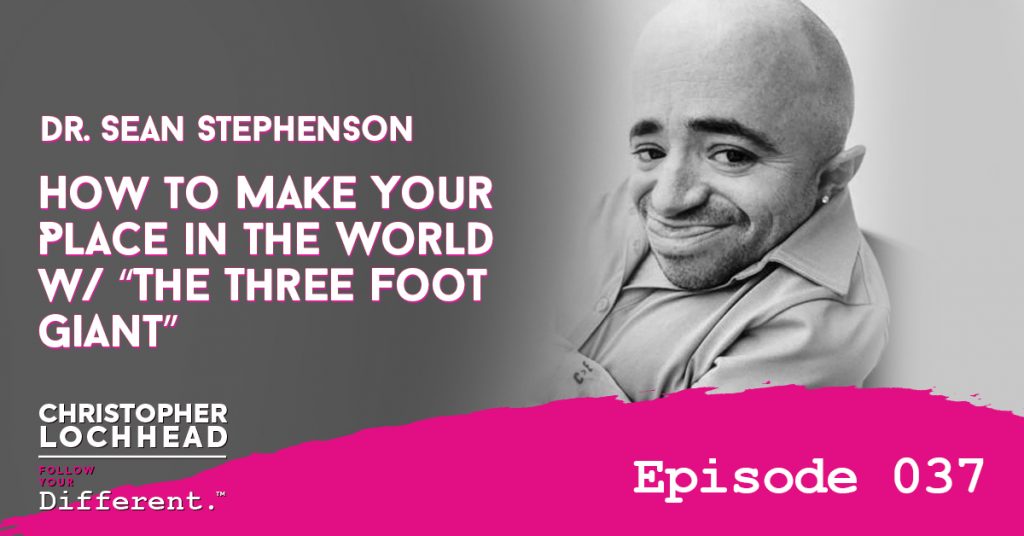
Podcast: Play in new window | Download (Duration: 1:16:19 — 70.1MB) | Embed
Subscribe: Apple Podcasts | Spotify | Pandora | RSS | More
Is it possible to live multiple lives in this lifetime? Today, the three-foot giant Dr. Sean Stephenson joins us for a wonderful conversation on growth, purpose, and a lot more.
Continuing to Grow
Even after achieving his stature as a public speaker, Sean admits that he’s still growing. He was in business with his father for 22 years and didn’t leave home until he was 31. Perhaps owing to his severe physical disability, he was very close to his family.
His home life was wonderful, but as he got older, it got more difficult. Being in the same roof with his family, he always had a group thinking and felt like he was curbing himself. So he decided to go through a very painful business breakup and step out into the world.
Learning to Walk
We can’t read the label inside the jar. Sean didn’t know how much he was holding back his own opinions or how much he was fully being himself. But when he moved and broke away, he started seeing how there were new levels and layers to him.
The stark differences between his and other people’s experiences growing up shocked him. After all, he was used to a culture where not doing what the family wants equals being a renegade.
“I have decades and decades of education where I help people through their pains and their problems. But in some ways, I’m still learning to walk myself, learning to navigate this world, and I’m loving the experience of making mistakes.” – Dr. Sean Stephenson
Breaking the Mold
It personally sickens him to think that some people would want to live the same life a hundred times over. To continue his self-discovery, he would reorganize his life every five years or so. He wants to look back on the past five years with a stack of embarrassing mistakes to learn from.
Sean confesses that he wouldn’t hang out with his younger versions with interests that wouldn’t necessarily appeal to him now. He loves himself all the more for it. And he can only wish the version of himself five or ten years down the road would feel the same way with the present.
“Maybe there’s a wrongful belief out there that the version of you will always be the same as you get older but I don’t agree with that. I’m constantly breaking the mold and starting over and trying new things and figuring out what do I believe in.” – Dr. Sean Stephenson
To hear about why purpose is sexy and how Sean turned his “disability” into a competitive advantage, download and listen to the episode.
Bio:
Dr. Sean Stephenson was predicted not to survive at birth because of a rare bone disorder that stunted his growth and caused his bones to be extremely fragile (fracturing over 200 times by the age of 18).
Despite his challenges, he took a stand for a quality of life that has inspired millions of people around the world.
Since 1994, his powerful message has been heard at live events in nearly all 50 states and in 16 countries.
Sean has presented at hospitals, universities, prisons, and to companies such as Nike, Whole Foods, Zappos, Walmart, and Sharp Healthcare. He has shared the stage with U.S. Presidents, billionaire business moguls, celebrities, and his Holiness the 14th Dalai Lama.
Sean has appeared on everything from The Oprah Show to Jimmy Kimmel, in addition to online videos with tens of millions of views.
The Biography Channel produced an hour-long feature on his life called, Three Foot Giant.
Mindie Kniss & Sean Stephenson his international best-selling book, Get Off Your “But”, has been translated into over a dozen different languages.
As a board-certified therapist, and doctor of Clinical Hypnosis, Dr. Stephenson sees clients in a unique 12-hour session that gets to the root of their fears, excuses, and insecurities.
Each year Sean hosts live events and group coaching programs to mentor individuals in the art and business of public speaking.
When Sean isn’t working he can be found in the gym, playing NBA 2K with his friends, or watching NBA basketball with his wife and business partner, Mindie Kniss.
Both Chicago-natives, Sean and Mindie have traveled the world, but now call Scottsdale, Arizona, home.
Link:
We hope you enjoyed Dr. Sean Stephenson on this episode of Follow Your Different™! Christopher loves hearing from his listeners. Feel free to email him, connect on Facebook, Twitter, Instagram and subscribe on iTunes!
036 Loonshots The Power of Crazy Ideas w/ Safi Bahcall
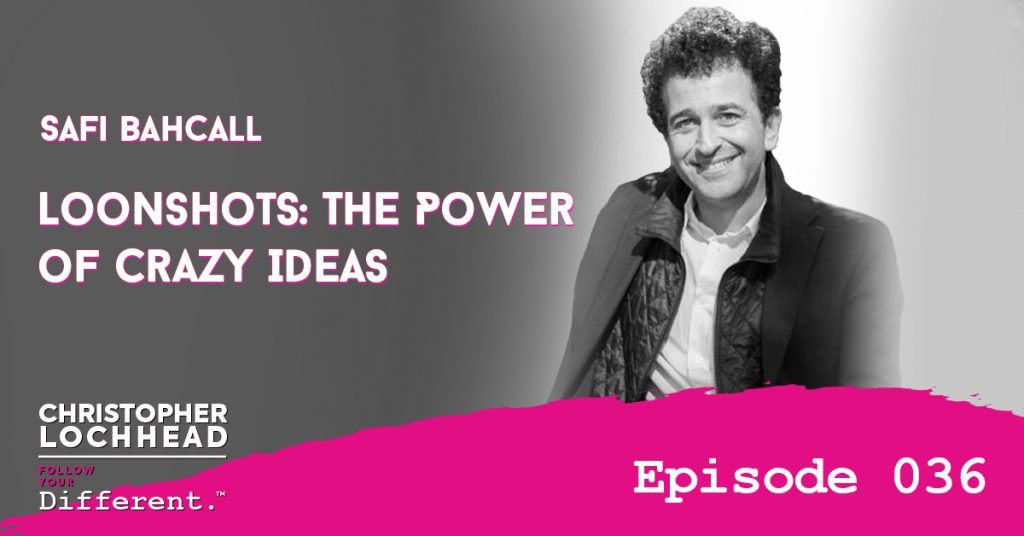
Podcast: Play in new window | Download (Duration: 1:38:24 — 90.3MB) | Embed
Subscribe: Apple Podcasts | Spotify | Pandora | RSS | More
How can structure drive culture? On today’s episode, the amazing author of
Is It Really Culture?
When Safi first became an entrepreneur, he read every article and book he could find on various subjects like how to become a good leader and build great teams. All those things sounded good, but after a while, he got hungry for something more solid.
“I was trying to understand if there was some science to this. If there was something else besides just culture.” – Safi Bahcall
He observed that companies with completely different cultures would succeed, while those with the same cultures failed. There are elements of culture that are very important. But is it really the culture that drives the success of an organization?
Structure Eats Culture for Lunch
Christopher shares that there are successful companies with the “biddings will continue until morale improves” culture. Then there are other successful organizations that adopt an “everybody loves each other” culture. From this standpoint, there seems to be no such thing as a culture that works and a culture that doesn’t.
“Well, there’s a saying in business that says, ‘Culture eats strategy for breakfast.’ What I would add is that ‘structure eats culture for lunch.’” – Safi Bahcall
It appears that structure enables exponential differences in organizations in a way that culture doesn’t as much.
Structure Drives an Organization’s Culture
To exemplify, Uber had an outlier incentive system. Nobody wanted to work on other people’s project because of the 8X incentive that successful project proponents could earn. No matter how many times teamwork was encouraged, nobody would actually get into it.
But when the team-based incentives began to roll out, the culture changed. People were rewarded based on team performance. This perfectly sums up how structure eats culture for lunch.
“It means that underlying structure can drive the culture, rather than the way around.” – Safi Bahcall
To hear about how water molecules relate to business structure and how genius and serendipity need to meet to produce breakthroughs from Safi, download and listen to the episode.
Bio:
Safi is a second-generation physicist (the son of two astrophysicists) and a biotech entrepreneur.
He received his BA summa cum laude from Harvard and his Ph.D. in physics from Stanford, where he worked with Lenny Susskind in particle physics (the science of the small) and the Nobel laureate Bob Laughlin in condensed matter physics (the science of the many).
He was a Miller Fellow in physics at UC Berkeley (the school of the many). After working for three years as a consultant for McKinsey, Safi co-founded a biotechnology company developing new drugs for cancer. He led its IPO and served as its CEO for 13 years.
Safi has presented at approximately 130 banking conferences, investor events, and medical meetings around the world, as well as at leading academic institutions including physics, mathematics, or medical departments at Harvard, MIT, Stanford, Princeton, UC Berkeley, Caltech, Cornell, Bell Labs, Dana-Farber Cancer Institute, Massachusetts General Hospital, Rockefeller, and the Weizmann Institute of Science in Israel.
He lives with his wife, two children, and roughly 37 Gerald + Piggie books in Cambridge, MA.
Links:
We hope you enjoyed Safi Bahcall on this episode of Follow Your Different™! Christopher loves hearing from his listeners. Feel free to email him, connect on Facebook, Twitter, Instagram and subscribe on iTunes!
035 The Legendary Ken Blanchard
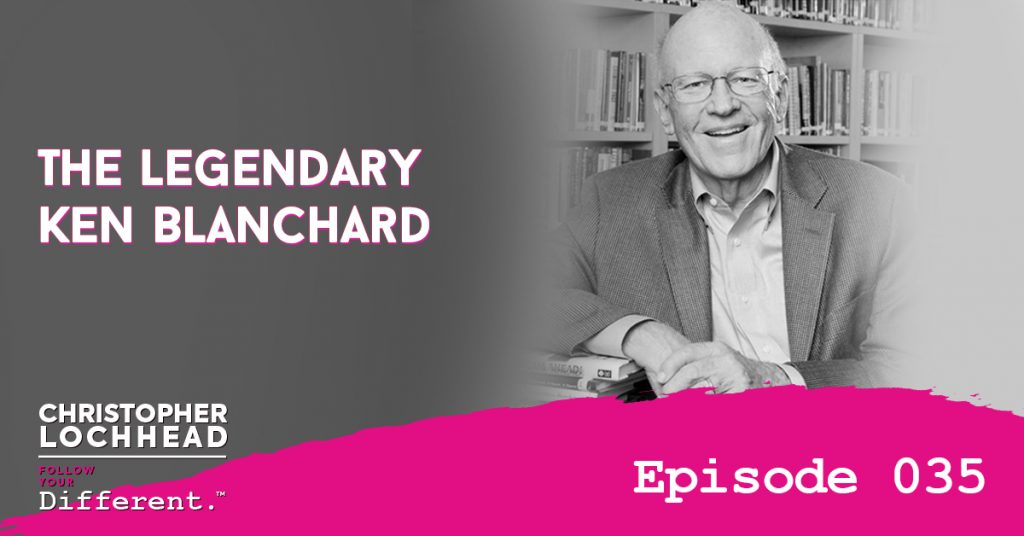
Podcast: Play in new window | Download (Duration: 1:16:01 — 69.8MB) | Embed
Subscribe: Apple Podcasts | Spotify | Pandora | RSS | More
Why does great service come from the heart? On today’s episode, Christopher sits with his hero Ken Blanchard. One of the greatest authors of all time shares why legendary customer service matters, the power that true servant leadership holds, and so much more.
Exemplifying Simple Truths
Christopher has personally looked up to Ken since reading the life-changing book, The One-Minute Manager. When he dropped out of school and had to seek other ways of learning, Christopher turned to the book that he has given to many others in return.
Simplicity marks everything that Ken writes and teaches. The living legend has written over 60 books, with a new one inspired by the story of Johnny the Bagger, The Simple Truths of Service.
“My mission statement is to be a loving teacher and example of simple truths.” – Ken Blanchard
Great, Simple Service
Everyone can make a difference in customer service without having to do anything complicated and by simply reaching out to customers and making them feel important. Great service that makes a difference comes from the heart. However, the human ego often sends people off track of being servant leaders.
Ego gets in the way of service in two ways. One is through false pride or the “more than” philosophy, where you act like you’re better than everyone else. And then there is fear or self-doubt, where you have a “less than” philosophy.
“A lot of people say, ‘That’s an ego problem?’ Sure, you focus on yourself.” – Ken Blanchard on self-doubt
Writing for People
Growing up, Ken’s parents instilled in him the value of staying grounded. When he became president back in junior high, his father reminded him that great leaders are great because people respect and trust them. His mother also taught him to neither think himself beyond others nor let others think they’re above him.
He has had a lot of valuable learnings in life. And all these motivate him to continue writing books.
“I just love learning for people.” – Ken Blanchard
To hear more about service and being yourself from Ken himself, download and listen to the episode.
Bio:
A prominent, sought-after author, speaker, and business consultant, Dr. Ken Blanchard’s friends, colleagues, and clients characterize him as one of the most insightful, powerful, and compassionate individuals in business today. Ken is one of the most influential leadership experts in the world and is respected for his years of groundbreaking work in the fields of leadership and management.
He is also the co-founder and Chief Spiritual Officer of The Ken Blanchard Companies, an international management training and consulting firm that he and his wife, Margie Blanchard, began in 1979 in San Diego, California.
Ken received a master’s degree from Colgate University and a bachelor’s and Ph.D. from Cornell University. Ken spends time as a visiting lecturer at his alma mater where he is a trustee emeritus of the Board of Trustees. He also teaches students in the Master of Science in Executive Leadership Program at the University of San Diego.
He has received many awards and honors for his contributions in the fields of management, leadership, and speaking. The National Speakers Association awarded him its highest honor, the “Council of Peers Award of Excellence.” He was inducted into the HRD Hall of Fame by Training magazine and Lakewood Conferences, and he received the Golden Gavel Award from Toastmasters International.
Ken also received The Thought Leadership Award for continued support of work-related learning and performance by ISA—The Association of Learning Providers. Ken has been inducted into Amazon’s Hall of Fame as one of the top 25 best-selling authors of all time. The business school at Grand Canyon University bears his name.
An avid golfer, Ken belongs to the Loch Lomond Golf Club in Scotland.
Links:
We hope you enjoyed Ken Blanchard on this episode of Follow Your Different™! Christopher loves hearing from his listeners. Feel free to email him, connect on Facebook, Twitter, Instagram and subscribe on iTunes!
033 Startup Traction Gap w/ Bruce Cleveland
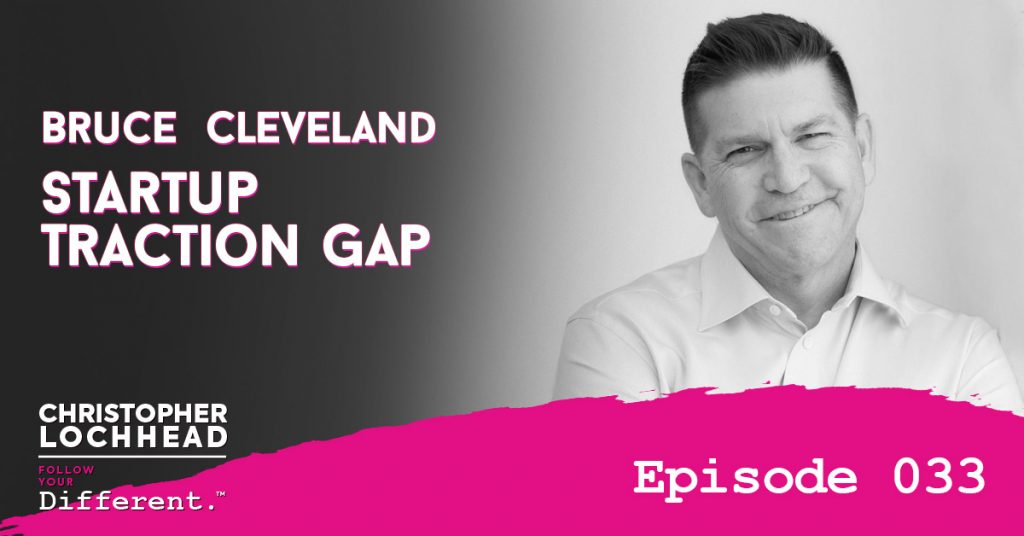
Why do most startups fail? Today, Bruce Cleveland joins us for a master class in building a massively successful B2B and why market engineering is a skill every executive needs. Listen in to learn how you can build your company and category to scale.
“Venture capital is a fairly interesting term or phrase. Because what I found is that there’s not a lot of venture in venture capital.” – Bruce Cleveland
Basic Patterns to Engineer Success
CEOs demonstrate basic patterns in engineering their success. But a lot of startups are not executing these patterns. Over the course of a decade in his prior firm, Bruce began to see which teams would have an actual chance for success.
He decided to explore these patterns, and he discovered three phases that every startup goes through. Even a new product offering in a large company will have to go through these same phases.
Go-to-Product and Go-to-Scale Phases
The first phase is the go-to-product phase. It begins with an idea, one that is hopefully informed by research. In this phase, you will have a prototype that you put in the market for some customers to get and provide feedback for in order to reach a more polished version called minimum viable product.
Skipping to the third phase, which is the go-to-scale phase, is where you finally get some customers and things are really working. Now, you have converted from being a PowerPoint company to a spreadsheet company. And you can finally show how good your product actually is.
Investors Look for Traction
Beyond reaching profitability, what most firms want to see is this thing called traction. They want to see demonstrable evidence that there’s a market and that people will purchase your product. And most of all, it needs to be enough evidence.
“That go-to-scale phase, there’s a lot of companies that will finance that. And there’s a lot of great brands that are out there that wait until you get to that point before they will invest in you.” – Bruce Cleveland
To learn more about the traction gap from Bruce, download and listen to the episode.
Bio:
Bruce Cleveland is a Founding Partner at Wildcat where he focuses on investments in artificial intelligence (AI) marketing, EdTech, enterprise software as a service (SaaS) and the Internet of Things (IoT). He’s also the author of Traversing the Traction Gap.
His specific areas of interest include enterprise automation, education and training, and general business applications. Bruce likes working with early-stage companies that use technology and data to increase revenue and decrease costs.
An avid adventurer and sailor, Bruce enjoys the challenge of creating new companies and navigating new markets.
Bruce began his venture capital career at InterWest Partners, where he was the first investor and a former board member of Marketo, which held an IPO in 2013 and was acquired by Vista Equity Partners in 2016 for $1.8 billion.
Links:
Wildcat Venture Partners – Traction Gap
We hope you enjoyed Bruce Cleveland on this episode of Follow Your Different™! Christopher loves hearing from his listeners. Feel free to email him, connect on Facebook, Twitter, Instagram and subscribe on iTunes!
032 Experiences w/ Joe Pine
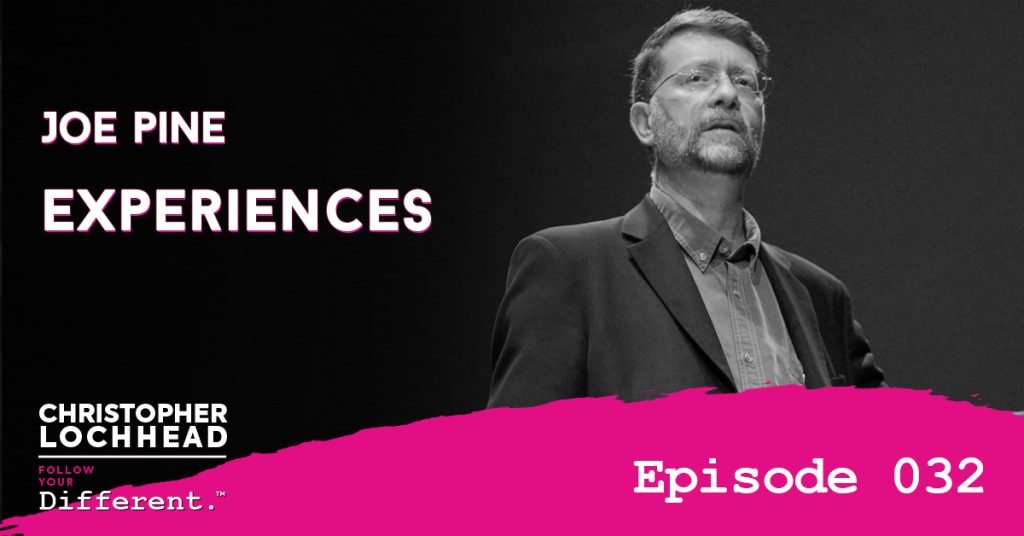
Are you a company people spend time with or save time with? On today’s episode, business thought leader Joe Pine joins us for a riveting conversation on why experiences remain important in the business sphere.
Progression of Economic Value
Joe and his partner opened their legendary book, The Experience Economy, with an anecdote on coffee beans. Coffee is a commodity that can be grown on the ground and a cup can cost 2 to 3 cents. But when you package coffee beans and sell them in stores, their value increases to 5 or 10 cents.
Even more, when you buy coffee from someone who brewed it for you, the cost increases to half a dollar. Finally, having coffee in an ambient environment like most coffee shops will have you paying up to $4 for a cup. This perfectly exemplifies the progression of economic value.“
When Companies Fail
Apple and Starbucks have succeeded in making experience part of their products through their retail stores. This is something that a lot of companies fall short in. Take for example Toys R Us, which went bankrupt recently.
“When you combine the great products that Apple has with the great experience they have in their stores, that’s when magic can happen.” – Joe Pine
Toys are the most experiential products in the world, even more than smartphones. But Toys R Us failed to see that putting them in a warehouse where kids couldn’t really play with them put their business in jeopardy.
Two Experience Strategies
As a company, you can choose between two strategies to make the customer experience better: the time well-saved strategy or the time well-spent strategy.
For the first one, you can divide the best possible service at the lowest possible price at the greatest possible experience for your customers. Meanwhile, there is also the second strategy where people actually value the time they spend with you.
“You gotta get people to value the time that they spend with you. Give them a reason to come into the store. Give them a reason to interact with you.” – Joe Pine
To hear about the four types of experiences and the value of being authentic from Joe, download and listen to the episode.
Bio:
Joe Pine is a legitimate business thought leader and among the founders of the experience economy. He and his partner James H. Gilmore wrote The Experience Economy: Work is a Theatre & Every Business a Stage in 1999, which demonstrates how goods and services are no longer enough. What companies must offer are experiences that engage each customer in an inherently personal way.
He helps clients to design strategies to leverage these new economic opportunities and create experiences that drive revenue.
Links:
Harvard Business Review – Welcome to the Experience Economy
We hope you enjoyed Joe Pine on this episode of Follow Your Different™! Christopher loves hearing from his listeners. Feel free to email him, connect on Facebook, Twitter, Instagram and subscribe on iTunes!
030 Outer Order, Inner Calm w/ Gretchen Rubin
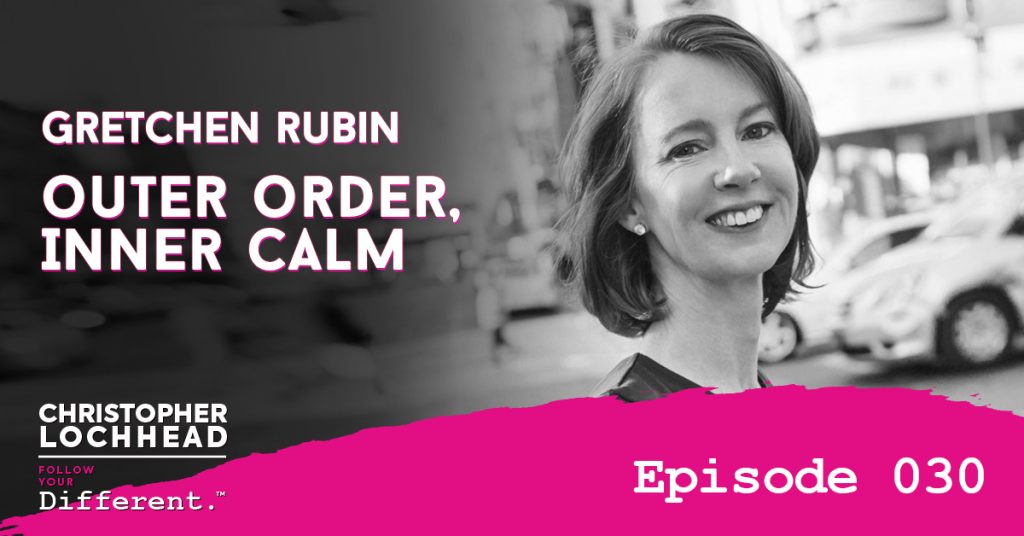
Podcast: Play in new window | Download (Duration: 1:09:03 — 63.4MB) | Embed
Subscribe: Apple Podcasts | Spotify | Pandora | RSS | More
How do you become happier in life? On today’s episode, four-time New York Times bestselling author Gretchen Rubin joins us for a fun, insightful conversation. How do you turn feeling envy and lying into tools for our own growth?
Relationships for Happiness
There are two ways to achieve happiness, depending on the mental framework that you use. One of which is that to be happy, we need to have enduring, intimate bonds.
“Ancient philosophers and contemporary scientists would agree that relationship is key to happiness.” – Gretchen Rubin
We have to feel like we belong, be able to confide a secret, get support, and give support. Anything that broadens or deepens our relationships is something that would make us happier. When we look at people who say they’re happier, they tend to have more relationships.
Self-knowledge is also Key
From a different vantage point, you can also say that the key to happiness is self-knowledge. We can build a happy life on the foundation of our own nature, interests, values, and temperament.
“It’s really by knowing ourselves that with this knowledge we can shape our lives to better reflect what is true for us.” – Gretchen Rubin
It should be fairly easy to know oneself when you hang out with yourself all day long, right? But the truth is that it’s not very easy at all. This stems from how we sometimes wish that we were different from who are or from how we are different from what other people expect or want us to be.
Envy and Lies are Helpful
Gretchen is keen on finding questions or indirect ways to help us understand ourselves better. For instance, whom do we envy? People don’t want to admit they feel it, but envy is actually helpful because it shows us what we wish we had.
Another question we must ask ourselves is, what do we lie about? Oftentimes when we lie, what we do doesn’t match up with what our value is and this is really important information to reflect on.
“The fact that you’re not being truthful about it means that somehow, you’re not comfortable with what your real answer is and that’s a sign—hey, maybe I need to get my actions and values into better harmony.” – Gretchen Rubin
To hear more about how we can achieve inner calm and peace from Gretchen, download and listen to the episode.
Bio:
Gretchen Rubin is a writer who relentlessly explores human nature to understand how we can make our lives better.
She believes there’s no one-size-fits-all solution for becoming happier, healthier, more productive, or more creative; when we know ourselves and what works for us, we can change our habits and our lives.
She’s the author of the bestselling books (The Happiness Project, Happier at Home, Better Than Before, The Four Tendencies),
And she hosts the award-winning podcast Happier with Gretchen Rubin,
The New York Times calls her “the queen of the self-help memoir.”
Links:
We hope you enjoyed Gretchen Rubin on this episode of Follow Your Different™! Christopher loves hearing from his listeners. Feel free to email him, connect on Facebook, Twitter, Instagram and subscribe on iTunes!

